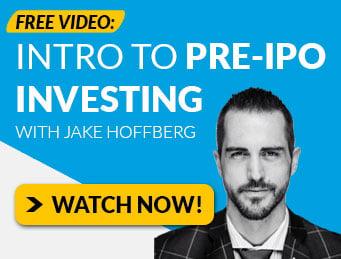Peter Thiel — the Paypal co-founder, Gawker killer, and professional rabble-rouser — was in the news again recently.
This time, for his somewhat controversial method of bringing his current company, Palantir, to market.
Instead of taking the traditional IPO route… or jumping on board the SPAC trend … Palantir decided to go with a direct listing — and take full advantage of refreshed rules surrounding direct listings.
But the real story is the new three-tiered share classification they’re using.
Here’s why…
Tiers of a Clown?
When most people think of buying shares, they think of traditional, voting stock shares. One class that rules them all.
But there has long been another type of share: the non-voting share.
This type of share hasn’t been used very often. After all, creating more than one type of share just adds headaches and expense to an IPO…
Creates a confusing cap table when trying to determine the ownership structure of a company…
And non-voting shares will never be as popular as full voting shares, anyway.
Throughout most of investment history, non-voting shares (or, sometimes, shares with diluted voting power) were a way to add a secondary, more affordable option to invest in a popular company.
Berkshire Hathaway’s B class shares are the classic example.
When regular Berkshire shares (now called A shares) were trading in the six-figure range, Buffett and Co. decided to introduce shares with fewer rights, and a smaller voice… but at a much more affordable price tag.
That was the primary role of non-voting shares for decades… until Google had its IPO.
In what some would call a shrewd move (and others would call abuse of investors) Google set up a two-tier share system.
From the start, there were publicly-available shares… and then a separate class of shares, owned by Google’s founders and a few early investors, in which all voting power resided.
Or, to be more specific, enough voting power was concentrated in the private shares that the publicly-available shares could never outvote the founders.
This gave Google the freedom to explore moonshots without worrying about stockholders… the freedom to think long-term instead of being captives of quarterly results… and, obviously, gave Google’s founders a very comfortable perch from which they could never be unwillingly toppled.
Plenty of other Silicon Valley companies have followed suit. Facebook used the exact same playbook, to cement Mark Zuckerberg as one of the most powerful and untouchable CEOs in the world.
WeWork was ready to take it to a new extreme — doubling up the power of founder shares — until WeWork’s core business fell apart before that plan could come to fruition.
But where WeWork failed to iterate, Palantir will.
We’re Tiering Up
Thanks to relaxed rules surrounding direct listings, Palantir is preparing to sell off a number of shares in its company.
But here’s the rub: There will be no new shares created, only currently-existing ones sold. That’s the defining characteristic of a direct listing — although recently passed rules allow direct listings to create new shares as well, if so desired…
More importantly, Palantir introduced a three-tier system of shares.
- The classic stock — one share, one vote.
- The “B class” stock — one share, ten votes.
- And the “F class” stock — one share, a variable undefined number of votes.
The “F” in “F class” is for “Founder” — and the three founders of Palantir hold all F class shares. The F class stock makes up 49.99% of the vote.
But combined with other classes of stock that the founders also own, they retain over 50% of the voting power in the company… and they’re answerable to no one.
This is somewhat ironic, given that Peter Thiel has been an outspoken critic of Google’s share structure in particular. He recently said that the company’s innovation has been neutered by its lack of investor pressure.
Ditto Facebook, and any other company that has made life too comfortable for the folks in charge.
But while he’s perfectly willing to throw stones from the outside, it seems Thiel and co. are very happy to insulate themselves when it comes to their own company.
That kind of hypocrisy isn’t winning Thiel, or Palantir, many friends in the tech world.
Regardless of the back and forth — and the new three-tier share class system — Palantir stock has nearly quadrupled since it was listed last September.
Investors have shrugged off years of losses — including $580 million in 2019, and over $1 billion through the end of September in 2020.
That’s not to say Palantir can’t be a successful company while bleeding money. Amazon famously went years without a profit.
But Amazon didn’t have profits because it pushed all gains right back into the business. What’s Palantir’s excuse?
No Tier-Stained Cheeks Here
For the moment, we’re taking a wait-and-see approach to Palantir’s direct listing. This was one of the first direct listings under the new rules, and it was the first major listing that involved three tiers of share class.
The stock has done very well since it started trading. But it’s early yet. Let’s see how patient investors are the first time Thiel and his fellow founders decide to go in an unpopular direction.
Zuckerberg gets away with it, as he leads one of the richest and most famous companies in the world. He continues to rake in profits and make money for his investors.
Will Thiel get the same rope running a company that’s bleeding money?
I suspect not.
But what will investors do about it?
Perhaps they’ll sell off their shares when the road gets bumpy. After all, they really don’t have any other vote available.
Sincerely,
Ryan Cole – Analyst
Equifund
P.S.
Looking for exciting pre-ipo deals with only ONE share class?
Here at Equifund, we closely examine the share structure of any deals brought to us, as part of our intake process.
Having tiered shares isn’t necessarily a deal-breaker. Because a tiered system can work if it’s ensuring enlightened leadership is keeping a firm grip on the reins.
But if it’s just to protect a thin-skinned founder? Well, that won’t pass muster with us.
And it shouldn’t with you either.





